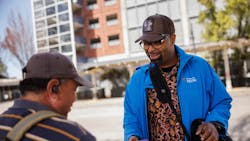King County Metro continuing to improve security presence on transit systems
To improve its safety presence on its transit system, King County Metro Transit has more than doubled its Transit Security Officers (TSOs) during the past two years from 70 to 160, deployed Metro Ambassadors to provide customer support and activated a Behavioral Health Support Team to aid customers who are in crisis or need of resources.
According to King County Metro, TSOs boarded 2,093 buses in February 2023 to provide a safety and security presence. By November 2023, they had increased their monthly boardings to more than 10,000 buses. At Aurora Village Transit Center and Burien Transit Center, TSOs began providing overnight coverage in March 2023 and then expanded to 24/7 coverage in June 2023.
King County Metro Ambassadors, which can be identified by the blue jackets they wear, assist customers in higher-ridership areas and during popular events such as concerts and sports. King County Metro notes many of the ambassadors served as King County Metro bus operators and have a deep knowledge of the transit network. Metro Ambassadors use a language interpretation service to communicate with riders in more than 140 languages.
In addition to delivering resources and support, the King County Metro Behavioral Health Support Team is trained in de-escalation and prevention to reduce the need for police or security. The team provides cold weather supplies, connections to community partners, de-escalation interventions, food, hygiene items and shelter referrals.
King County Metro says its “care and presence” approach is already making a positive difference. Security incidents in 2023 were down 12 percent from 2019 (before the COVID-19 pandemic) and down 22 percent from the peak of the pandemic in 2020. Drug-related incidents in January 2024 were down 33 percent from January 2023.
Rider expectations and consequences
In addition to the proactive presence of King County Metro Transit Police and TSOs, bus operators can request their support. King County Metro says moderate infractions of the agency’s Code of Conduct may result in verbal reminders and removal from transit. More severe infractions—such as assaults or drug use—can lead to arrest and/or a suspension of transit use for a period of time. In some cases, passengers are also suspended for repeated moderate offenses, protecting the experience of other passengers while providing an avenue for improved behavior.
